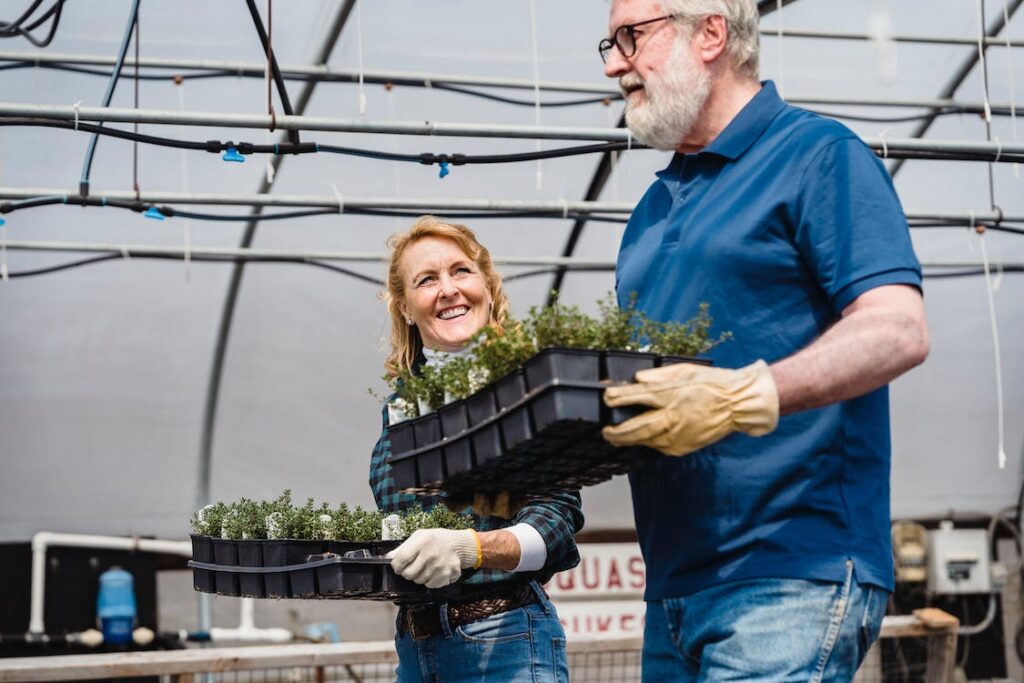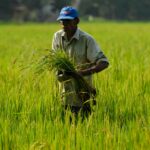As part of our ongoing series of London dinners, we enjoyed a great discussion in April on the role of gender considerations working on agricultural supply chain commodities. Our most recent dinner was attended by a great group of inspiring decision makers and practitioners from the corporate (Diageo, Barclays) and non-profit sector (Care, Cherie Blair Foundation for Women, Better Cotton, Producers Direct). Our get together was a welcomed opportunity to relax and explore the challenges, insights and solutions impacting the delivery of Goal 5 (Gender Equality) across smallholder value chains.
A gender perspective applied in agricultural commodity supply chains involves considering the roles, needs, and contributions of both men and women throughout the supply chain. It recognizes that gender inequalities and differences exist, and that they can significantly impact the agricultural sector and supply chain dynamics. Applying a gender perspective seeks to promote gender equality, empower women, and enhance the overall sustainability and inclusivity of agricultural commodity supply chains. Here are some key aspects of a gender perspective in this context:
- Gender roles and division of labor: Understanding the different roles and responsibilities of men and women in agricultural production and supply chains is essential. It involves recognizing the specific tasks, skills, and knowledge that each gender typically contributes. For instance, women often play a crucial role in activities such as food processing, post-harvest handling, and marketing, while men may be more involved in primary production or decision-making roles.
- Access to resources and services: A gender perspective highlights the disparities in access to productive resources, including land, credit, inputs, and technology. It aims to identify and address the barriers that women face in accessing these resources and services, which can limit their participation and productivity in agricultural commodity supply chains. Efforts are made to promote equal access and create supportive environments for women’s entrepreneurship and leadership.
- Income and economic empowerment: Gender perspectives recognize the income disparities between men and women along agricultural commodity supply chains. Women often face challenges in earning equitable income, receiving fair prices for their products, and accessing markets. Promoting gender equality involves initiatives to enhance women’s economic empowerment, such as providing training, facilitating access to markets, and supporting women’s entrepreneurship.
- Labor conditions and rights: Considering the gendered aspects of labor conditions and rights is crucial. This includes addressing issues such as unequal wages, occupational health and safety risks, and the recognition of women’s unpaid care work in rural areas. Efforts are made to ensure that both men and women in the supply chain have access to fair and safe working conditions, social protection, and representation in decision-making processes.
- Value addition and market opportunities: Applying a gender perspective involves recognizing the potential for value addition and market opportunities that benefit both men and women. It involves supporting women’s entrepreneurship, promoting gender-responsive value chain development, and integrating gender considerations into market linkages and value chain development programs. This can help create inclusive business opportunities and enhance the economic empowerment of women.
- Gender mainstreaming and policy advocacy: Integrating gender considerations into policies, programs, and institutions related to agricultural commodity supply chains is an important aspect of a gender perspective. It involves advocating for gender mainstreaming in relevant policies, conducting gender-responsive research and data collection, and collaborating with stakeholders to promote gender equality and women’s empowerment in the agricultural sector.
By applying a gender perspective in agricultural commodity supply chains, it becomes possible to address gender inequalities, promote women’s empowerment, and unlock the full potential of men and women as key actors in sustainable and inclusive agricultural development.
Why Addressing Gender Issues in Agricultural Commodity Supply Chains Can Improve Environmental and Human Right Profile of Sourcing Activities for Business?
Addressing gender issues in agricultural commodity supply chains can indeed improve the environmental and human rights profile of sourcing activities for businesses. Here’s how:
- Enhanced environmental sustainability: Women often play a significant role in natural resource management, including soil conservation, water use, and biodiversity preservation. By addressing gender inequalities and empowering women in agricultural supply chains, businesses can benefit from their knowledge and contributions to sustainable farming practices. Women’s inclusion and participation can lead to more effective resource management, increased adoption of environmentally friendly techniques, and improved resilience to climate change.
- Increased social responsibility: Integrating a gender perspective and promoting gender equality in supply chains demonstrates a commitment to social responsibility. It recognizes the rights, dignity, and well-being of women, ensuring fair treatment and equal opportunities. Businesses that actively address gender issues contribute to more inclusive and equitable supply chains, aligning with internationally recognized human rights principles and standards.
- Improved working conditions: Gender considerations in supply chains can lead to improvements in working conditions for both women and men. By addressing gender-based discrimination, promoting equal pay, and ensuring safe and fair labor practices, businesses can enhance the overall human rights profile of their sourcing activities. This contributes to a more ethical and responsible supply chain, fostering worker satisfaction, productivity, and long-term relationships with suppliers.
- Reduced social risks and conflicts: Gender inequalities can contribute to social risks and conflicts within communities and supply chains. By addressing these issues, businesses can help prevent or mitigate potential conflicts related to land tenure, resource access, or unequal benefits distribution. Promoting gender equality and empowerment fosters social cohesion, community development, and stability, reducing the risks of disputes or disruptions to sourcing activities.
- Access to markets and certification requirements: Some markets and certification programs have requirements related to gender equality and social sustainability. Addressing gender issues in agricultural supply chains can help businesses meet these requirements and access premium markets or certification schemes that prioritize social and environmental responsibility. This opens up opportunities for market differentiation, improved brand reputation, and increased consumer trust
Overall, by addressing gender issues in agricultural commodity supply chains, businesses can contribute to a more sustainable, ethical, and socially responsible sourcing approach. This not only benefits the environment and human rights but also strengthens business resilience, competitiveness, and stakeholder relationships.
How to Engage Rural Farmer Communities in Gender Programs?
Corporate buyers play a crucial role in supporting gender considerations when sourcing agricultural commodities. Here are some key aspects of their role:
- Demand for gender-inclusive supply chains: Corporate buyers have the power to influence market dynamics and set sourcing requirements. By explicitly expressing their demand for gender-inclusive supply chains, corporate buyers can incentivize suppliers to address gender issues and promote gender equality throughout the agricultural commodity value chain. This can create a market-driven incentive for suppliers to adopt gender-responsive practices.
- Collaboration with suppliers: Corporate buyers can collaborate closely with their suppliers to promote gender considerations. This involves engaging in dialogue, sharing knowledge, and providing guidance and support to suppliers on integrating gender equality into their operations. Buyers can encourage suppliers to adopt gender-responsive policies, practices, and programs, and help build their capacity to implement and monitor these initiatives effectively.
- Supplier assessment and monitoring: Corporate buyers can incorporate gender considerations into their supplier assessment and monitoring processes. This includes evaluating suppliers’ gender policies, practices, and performance indicators related to gender equality, women’s empowerment, and social sustainability. By including gender-related criteria in supplier evaluations, buyers can encourage suppliers to prioritize and improve their gender-related efforts.
- Capacity building and training: Corporate buyers can contribute to gender capacity building and training initiatives for suppliers. This may involve organizing workshops, training programs, or knowledge-sharing platforms focused on gender equality, women’s empowerment, and best practices for promoting gender-inclusive supply chains. By building suppliers’ awareness and capacity, corporate buyers can support their efforts to implement gender-responsive strategies.
- Traceability and transparency: Corporate buyers can promote traceability and transparency in their supply chains, particularly regarding gender-related issues. This can involve ensuring visibility into the participation of women farmers, workers, and entrepreneurs at different stages of the supply chain, and tracking the impact of sourcing practices on gender equality outcomes. Transparency and traceability enable buyers to assess the progress made and identify areas for improvement.
- Collaboration with stakeholders: Corporate buyers can collaborate with various stakeholders, such as NGOs, civil society organizations, and gender experts, to strengthen their gender-related efforts. This collaboration can involve sharing best practices, aligning standards and guidelines, and collectively addressing gender challenges in agricultural commodity sourcing. Collaborative initiatives with other buyers can also amplify the impact of gender considerations by creating a collective demand for change.
- Reporting and communication: Corporate buyers can transparently communicate their commitment to gender considerations in their supply chains. This can be done through sustainability reports, public statements, and engagement with stakeholders, including consumers. By showcasing their efforts and progress in integrating gender considerations, buyers can raise awareness, inspire other companies, and contribute to a broader movement towards gender-inclusive supply chains.
By actively supporting gender considerations in agricultural commodity sourcing, corporate buyers can drive positive change and contribute to more sustainable and equitable supply chains. Their influence, combined with collaborative efforts across the value chain, can help create an enabling environment that empowers women, promotes gender equality, and improves the livelihoods of rural farming communities.









